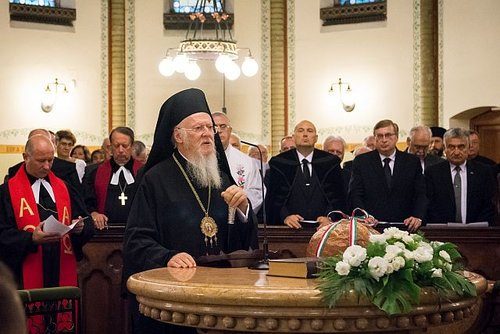
On a common path

Demetrios Archondonis, as the community of the Aegean island of Imbros (Turkey) got to know the future Bartholomew I., Ecumenical Patriarch of Constantinople, served as an altar boy in his native village’s parish.
Ministry in all circumstances, through rain and wind on a donkey
The young Demetrios assisted Father Asterios village pastor as an altar attendant, both in the village at its central church dedicated to St. George, and at the pastor’s ministry on his way to the numerous remote chapels around the countryside. They travelled along narrow mountain paths, through rain and wind on a donkey from community to community. The young Demetrios’ duty was to carry the Sacred Vessels for the services. It happened quite often that the Father rang the bells and only the two of them were present in the chapel.
He did not intend to become a priest
As a young altar boy, Demetrios had no dreams at all of a priestly vocation, rather he experienced God’s mysterious presence through the liturgy. Upon being ordained a priest, his motivation was to create something real important for his Church. Demetrios Archondonis fulfilled his military obligation in the Turkish army reserve, was ordained to the priesthood at the age of 21, then in 1991 was elected Head of the Ecumenical Patriarchate, under the monastic name of Bartholomew I., as the 270th Archbishop of the Church founded by St. Andrew. He pursued his studies in Rome, Bossey (Switzerland) and in Munich (Germany). In 2013 the Police stepped up strict security around the Patriarch, since an alleged plot against him was confirmed and several people were arrested.
From Him, through Him, towards Him
The paper ortodoxszemle.org recalled the Patriarch’s testimony, whereby His All Holiness Bartholomew I. mentioned the recognition of his main life experience: “we have been created, we have got our life from someone, in fact we have got it from God. (‘Everything is from Him’). In the liturgy we experience God’s presence in a unique way, moreover we are called to live in God. (‘Everything is through Him’). The word Eucharist literally means “thanksgiving”, in which life strives towards God. (‘Everything is towards Him’). His choice for a priestly vocation was highly motivated by the need to continuously experience God’s mysterious presence during the Holy liturgy. His vision includes the Christian feeling, understanding, experiencing and consciousness that are all present in God’s existence.

The Holy purpose
Bartholomew I. -often called as “the Green Patriarch”-, works a lot and hard to achieve the orthodox cooperation, the ecumenical dialogue, and the environmental protection. He speaks seven languages, Greek, Turkish, Italian, German, French, English and Latin. “The sacramental unity between the East and West Christians is a Holy purpose” – emphasizes the Patriarch. It is more than evident for Bartholomew I. that orthodoxy definitely belongs to Europe, to what we call “Western civilisation.” Orthodoxy is not a separate Eastern-Christian civilisation within the frame of the united Europe.
Plundered, oppressed
The title “Ecumenical” of the Patriarch of Constantinople dates back to the 6th century, however legally it has not been recognised by the Turkish government so far. The Patriarch of Constantinople is the spiritual leader to 300 million Orthodox Christians worldwide. The See of the Patriarchate is in Turkey, where 99 % of the population is Muslim, while the Orthodox presence is small, the number of the believers’ amount up to some 4,000 only. The Orthodox Christian minority is a much unwelcomed community in the Middle East country, its properties, churches, monasteries, schools have been closed and seized by the Turkish government.
“We love our country…”
Local authorities recognize the Patriarch as a simple bishop, a spiritual leader only. “We feel like we are treated as a second-class citizen, we are not equal to our Turkish fellow citizens, and we are not provided with the same rights.” – assessed His Holiness the situation in his interview with the Greek City Times.
To the journalist’s question as to why the Head of the multi-million Orthodox community still hangs on to a 99 % Muslim country, the Church leader said: “We love our country, this is our birth place and we want to die on this land. We do feel that we were chosen to stay here by mission, as we have been bound here for 17 centuries by now.”
Eternal community
The Patriarch does not understand the Turkish authorities’ behaviour of not respecting the Orthodox community (…), and putting them into a somewhat marginal situation. “I have already met the Prime Minister several times by now, I repeatedly addressed him the problems, asking for his support. But all in vain.” – stated Bartholomew I. expressing his firm views on his community’s future existence: “We have survived so far, and we still believe in miracles.”
The Hagia Sophia case
The Orthodox Church Leader is shocked and overly saddened that the Church of Hagia Sophia, originally operating as a Byzantine Cathedral, recently has been transformed into a Mosque.
“What can I say as a Christian leader and the Patriarch of Constantinople? Instead of binding us together, this 1,500 years old heritage divides us.” – voiced his view Bartholomew I.
Schism in the 21st century
On October 11, 2018 the Ecumenical Patriarchate agreed to grant independence to the Orthodox Church in Ukraine. The document was signed in Istanbul, by which the Ecumenical Patriarchate has recognised the autocephaly of the Ukrainian Orthodox Church, sanctifying its separation from the Russian Orthodox Church, the Ukrainian Church was in union with since 1686. In response, the Russian Orthodox Church broke the relationship and decided to cut all ties with the Ecumenical Patriarchate, by declaring impossible to continue the Eucharistic communion.
A painful break
The Istanbul decision has been taken by Moscow and the other Orthodox Churches as the greatest conflict in the past thousand years history of Christianity. The step was commented by Patriarch Bartholomew I. “Regrettably our sister Church has broken up with us to express her dissatisfaction regarding the Ukrainian Church.” He then added: “No matter what happened, still we do love the Russian Church. We all took the breakup badly, and I would like the relationship between our Churches to be shaped again by peace and love.”

The bond to the Hungarians
This year on August 20 will be the twenty-first year anniversary that the Eastern Orthodox Church has recognised our first King and founder of Hungary, as a Saint. The long standing painful disunity of the past centuries since 1054, when the Orthodox Church had split from Rome, finally arrived to a reconciliation on August 20, 2000, when Bartholomew I. canonized St. Stephen, first King of Hungary from the Árpád Dynasty, and enlisted him into the row of saints of the Orthodox Church. The same day he also canonized Bishop Hierotheos, the first missionary Bishop delegated to Hungary, a contemporary of King St. Stephen, who set up churches, monasteries, and baptized Stephen’s mother, Sarolt.
An extraordinary step
On August 20, 2000, on the feast-day of King St. Stephen, during the Holy Mass celebrated outside the St. Stephen’s Basilica, Budapest, His All-Holiness Ecumenical Patriarch Bartholomew I. read the statement recognizing King Stephen also as a Saint of the Eastern Orthodox Church. This step was even more extraordinary, since it happened for the first time ever from the 1054 schism, that the Eastern Orthodox Church canonized a Saint of the Roman Catholic Church. In recognition of the gesture, the Patriarch was awarded the Grand Cross of the Order of Merit of the Republic of Hungary, while the Pázmány Péter Catholic University inaugurated him as an honorary doctor.
Greek Orthodoxy in Hungary
The Ecumenical Patriarchate of Constantinople holds a special place of honour –first among equals- within the 15 independent Orthodox Churches. The Patriarchate that had been under the authority of the Church of Antioch became independent in 330, and shortly afterwards it grew to be the second most important Church after Rome. Its present territory is way smaller to its original one, currently covering the area of Turkey, North Greece and some Greeks Islands in the Mediterranean. The diaspora’s Greek community, including the Greeks living in Hungary, and the Hungarian speaking Orthodox parishes with Byzantine traditions also belong to the Patriarchate. At the 2011 census of Hungary, 1701 people declared themselves to be Greek Orthodox.
Source: ortodoxszemle, Greek City Times, youtube, gondola.hu, Magyar Kurír, maltai.hu
Photo: Eszter Asszonyi (reformatus.hu)










